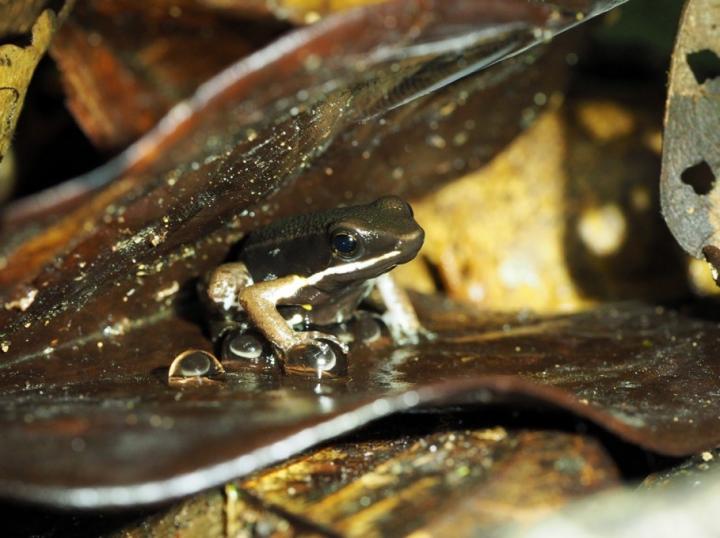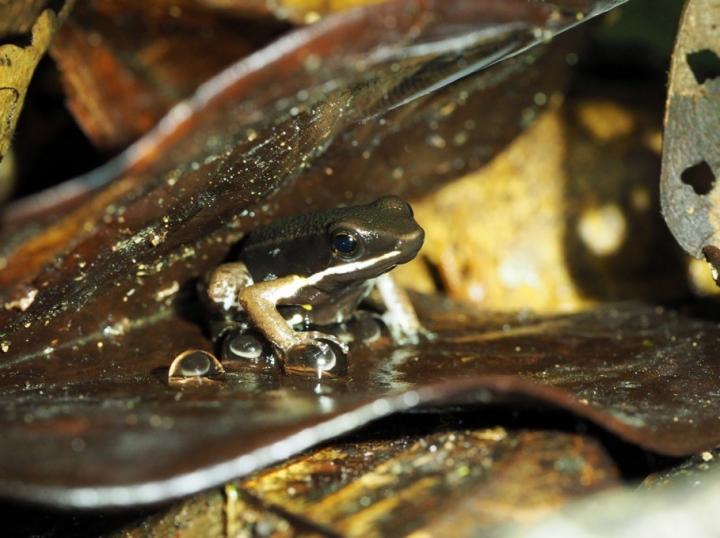
Credit: Andrius Pasukonis
In general, male poison frogs of the species Allobates femoralis are observed as very caring and attentive fathers. Eva Ringler and her team were able to show that territorial males care for all clutches inside their territory, even if they had not fertilised a single clutch in the previous weeks.
The current study showed, however, that they quickly stop their child-friendly behaviour when they succeed in taking over a new territory. In this case, the dedicated fathers became cannibals. They ate all the clutches in the new territory.
"Infanticide" across the animal kingdom
Cannibalism and infanticide are not uncommon in the animal kingdom. Among others, feline predators, primates, insects, fish and birds show these kind of behaviours. Eating unrelated offspring is often sexually motivated. In species with female parental care, mothers usually become ready to mate more quickly without offspring. Thereby, the perpetrators actually "kill two birds with one stone": on one hand, they reduce the reproductive success of other rivals – on the other hand, they increase their chances of future mating success.
In poison frogs, we find a completely different situation. Here, males are the ones responsible for parental care. Thus, infanticide by males does certainly not serve to manipulate females, but rather to reduce the risk of costly parental care towards unrelated offspring. Thereby, it seems that males' parental and cannibalistic behaviours are mediated by a single simple trigger.
Taking over new territory makes male frogs cannibals
In both cases – care and cannibalism – the territory, in particular the territorial behaviour, of male frogs, is the crucial factor. Inside their own territory which is prominently and vigorously defended, it doesn't cross the male frogs' minds that one of the clutches might not be their own. That is why they will transport all tadpoles that are located inside their territory to suitable water bodies, as soon as they are ready-to-go.
However, if they take over the territory of rival, male poison frogs become cannibals and take advantage in several respects. First, they completely clear the territory from their rivals that do not only lose their territories but also their offspring. Eating up all clutches of their precursor also means that the male frogs can be sure that all future clutches contain exclusively their own offspring. Furthermore, clutches are very nutritious and probably constitute a valuable source of energy.
Simple behavioural rule instead of complex decision-making procedure
Ringler and her team – starting from a field observation in the species' natural habitat – were able to experimentally test this behaviour in the lab, where they let a group of male Allobates femoralis effectively take over new territory by transferring them into a novel terrarium. A second group stayed in their original terrarium. In both cases, the researchers put unrelated clutches into their terrariums. The males in the "takeover" group became cannibals and preyed on the unrelated clutches, whereas the males in the 'resident' group spared the unrelated eggs and even transported them to the available water sites in most of the cases.
According to Ringler, the behaviour in the wild is likely very effective. "In the species' natural habitat, there are regular fights for territories and also territory takeovers. We expect that cannibalism commonly occurs in such situations," explained Ringler. Furthermore, cannibalism deprives the rivals of a motive to retake this specific territory because their former offspring are lost.
For Ringler, these results open up a novel perspective on cannibalism in the animal kingdom. "We have seen in poison frogs that a simple trigger is sufficient to switch from very destructive actions to parental care." In other animal species, individuals become cannibals out of sexual motivation or hunger, whereas territorial status seems to be the trigger in male poison frogs.
The behaviour of male poison frogs somehow reminds, among others, of conflicts in the Middle Ages, where during conquests not only the ruler was brought down and killed but also his offspring. This was to prevent them from claiming the throne. "But there was no cannibalism," concluded Ringler.
###
Service:
The article "Adopt, ignore, or kill? Male poison frogs adjust parental decisions according to their territorial status" by Eva Ringler, Kristina Barbara Beck, Steffen Weinlein, Ludwig Huber and Max Ringler was published in Scientific Reports. http://www.nature.com/articles/srep43544
About the University of Veterinary Medicine, Vienna
The University of Veterinary Medicine, Vienna in Austria is one of the leading academic and research institutions in the field of Veterinary Sciences in Europe. About 1,300 employees and 2,300 students work on the campus in the north of Vienna which also houses five university clinics and various research sites. Outside of Vienna the university operates Teaching and Research Farms. http://www.vetmeduni.ac.at
About Messerli Research Institute
The Messerli Research Institute was founded in 2010 with support from the Messerli Foundation (Sörenberg, Switzerland) under the management of the University of Veterinary Medicine, Vienna in cooperation with the Medical University of Vienna and the University of Vienna. The research is devoted to the interaction between humans and animals, as well as its theoretical principles in animal cognition and behavior, comparative medicine and ethics. Its work is characterized by its broad interdisciplinary approach (biology, human medicine, veterinary medicine, philosophy, psychology, law) and strong international focus. http://www.vetmeduni.ac.at/en/messerli/
Scientific Contact:
Eva Maria Ringler
Messerli Research Institute
University of Veterinary Medicine Vienna (Vetmeduni Vienna)
T +43 650 9780208
[email protected]
Released by:
Georg Mair
Science Communication / Corporate Communications
University of Veterinary Medicine Vienna (Vetmeduni Vienna)
T +43 1 25077-1165
georg.[email protected]
Media Contact
Eva Ringler
[email protected]
43-650-978-0208
http://www.vetmeduni.ac.at





